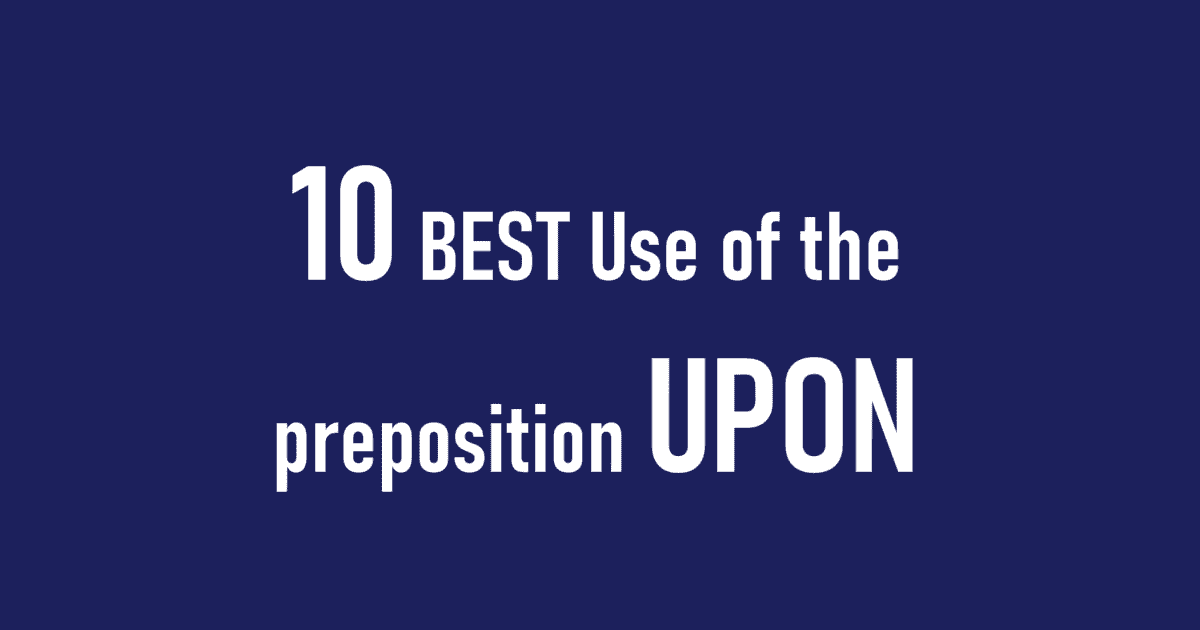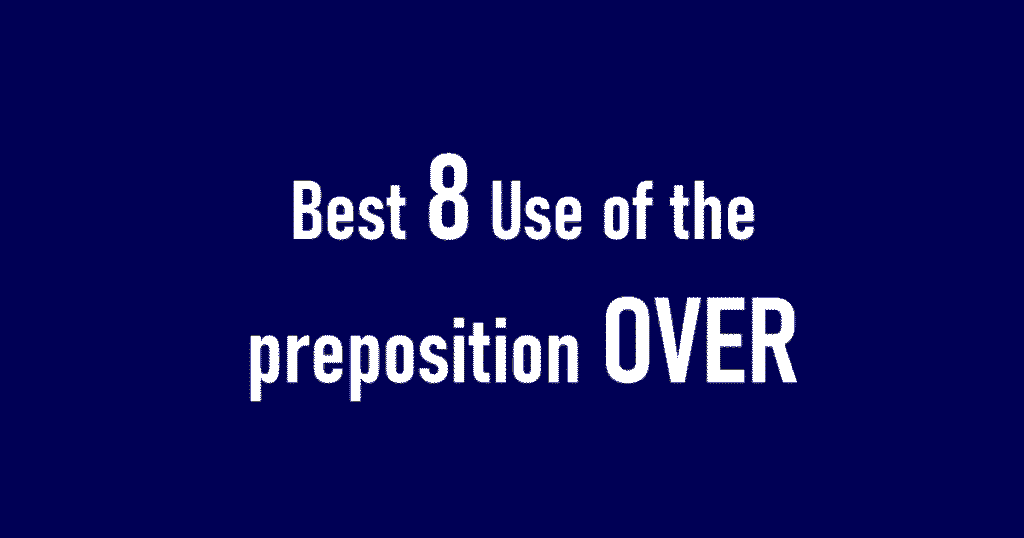Use of the preposition UPON. The English language is a rich tapestry woven with words that often overlap in meaning, yet possess subtle differences that add depth and precision to our communication. The preposition “upon” is a prime example of this linguistic nuance. While frequently perceived as a more formal or archaic synonym for “on,” understanding the specific contexts where “upon” shines can elevate your writing and speaking, adding a touch of sophistication and even clarity.
This comprehensive guide will delve into the multifaceted uses of “upon,” exploring its historical roots, its subtle distinctions from “on,” and the specific situations where it’s the preferred choice. We’ll dissect its meaning, examine its grammatical functions, and provide ample examples to solidify your understanding. Prepare to unlock the secrets hidden within this seemingly simple, yet powerful, preposition.
Use of the preposition UPON
A Look Back: The Historical Roots of “Upon”
The word “upon” has a long and storied history, tracing back to Old English. It’s formed from the combination of the preposition “on” and the adverb “up.” This etymology hints at a key aspect of its meaning: a sense of elevation, directionality, or emphasis. In Old English, “uppon” often implied a sense of being on top of something, both literally and figuratively.
While the distinction between “on” and “upon” has blurred over time, vestiges of this historical meaning remain. Think about phrases like “standing upon a hill” or “the weight of responsibility upon his shoulders.” These examples subtly suggest a higher position or a greater burden compared to simply “standing on a hill” or having “responsibility on his shoulders.”
Dissecting the Meaning: Beyond a Simple Synonym
At its core, “upon” shares the basic meaning of “on,” indicating a position, location, or contact with something. However, it’s crucial to recognize that “upon” isn’t always interchangeable with “on.” Here’s a breakdown of the nuances:
- Formality: “Upon” generally carries a more formal and somewhat archaic tone compared to the more commonplace “on.” Using “upon” can lend a sense of gravity or importance to your writing. Consider the difference between “Once upon a time…” and “Once on a time…” The former immediately evokes a fairytale atmosphere.
- Emphasis and Intensity: “Upon” can add emphasis to the action or state being described. It can highlight the importance or impact of the situation. For example, “focusing upon the details” suggests a more deliberate and meticulous approach than simply “focusing on the details.”
- Directionality and Motion: While not always explicit, “upon” can subtly imply a sense of upward movement or directionality. This is more noticeable in phrases where something is being placed or inflicted. Consider “rain falling upon the roof” – it evokes a more vivid image of the rain descending than “rain falling on the roof.”
- Figurative Language: “Upon” is frequently used in figurative language, particularly in idioms and metaphors. Its formal tone often complements the abstract nature of these expressions.
Specific Contexts Where “Upon” Thrives:
While understanding the general nuances is important, let’s dive into specific situations where “upon” truly shines and is often the preferred choice:
- Formal Writing and Speech: In academic papers, legal documents, and formal presentations, “upon” can contribute to a more sophisticated and authoritative tone.
- Literary Works: “Upon” is a staple in literature, particularly in older works or those aiming for a more elevated style. It adds a touch of elegance and can evoke a sense of timelessness.
- Idiomatic Expressions: Many well-established idioms and fixed phrases rely on “upon.” These include:
- “Once upon a time…” (as mentioned earlier)
- “Upon closer inspection…”
- “Upon further consideration…”
- “Call upon someone” (to request help or assistance)
- “Look upon something favorably”
- “Depend upon something”
- “Act upon something”
- “Impose upon someone”
- Following Certain Verbs: Some verbs naturally pair better with “upon” than “on.” This is often due to convention and idiomatic usage. Examples include:
- “Reflect upon”
- “Elaborate upon”
- “Impress upon” (to emphasize strongly)
- “Prey upon”
- To Avoid Ambiguity: In rare cases, “upon” can be used to avoid potential ambiguity that might arise from using “on.” Consider a sentence like: “He placed the book on the table that was broken.” This could mean the table itself was broken, or that the book was about a broken table. Replacing “on” with “upon” can subtly shift the focus to the placement of the book: “He placed the book upon the table that was broken,” suggesting he’s referring to the physical act of placing.
- Following Passive Voice Constructions: “Upon” is often used in passive voice constructions to maintain a formal tone and clarity. For instance, “The decision was based upon careful analysis” sounds more formal and perhaps more decisive than “The decision was based on careful analysis.”
Examples to Illustrate the Difference:
Let’s explore some examples to further highlight the subtle differences between “on” and “upon”:
- “She sat on the chair.” vs. “She sat upon the throne.” The first sentence is straightforward and neutral. The second, using “upon,” elevates the scene, suggesting a position of authority or importance.
- “He relied on his friends for support.” vs. “He relied upon his integrity.” While both are grammatically correct, the second sentence, using “upon,” emphasizes the importance and unwavering nature of his integrity.
- “They built their house on the hill.” vs. “They built their house upon the foundation of hard work.” The first is literal, describing the location. The second is figurative, highlighting the principles and effort that underpinned their success.
- “The responsibility rests on your shoulders.” vs. “The weight of responsibility rests upon your shoulders.” The second sentence adds a sense of heaviness and burden associated with the responsibility.
Common Mistakes to Avoid:
- Overuse: Avoid using “upon” simply to sound more sophisticated. Overusing it can make your writing feel stilted and unnatural. Use it strategically and deliberately.
- Incorrect Idioms: Don’t substitute “upon” for “on” in established idioms where it doesn’t belong. For example, it’s “on time,” not “upon time.”
- Awkward Phrasing: If using “upon” makes a sentence sound awkward or unnecessarily complex, opt for the simpler “on.” Clarity should always be prioritized.
Conclusion: Mastering the Art of “Upon”
“Upon” is more than just a fancy synonym for “on.” It’s a preposition with a rich history, subtle nuances, and specific uses that can enhance your writing and speaking. By understanding its historical roots, recognizing its different shades of meaning, and paying attention to the contexts where it thrives, you can master the art of using “upon” effectively.
Remember, the key is to be deliberate and strategic. Use “upon” when it adds value to your message, emphasizing importance, conveying formality, or contributing to a more evocative style. Avoid overuse and prioritize clarity. With practice and careful attention, you can unlock the power of “upon” and elevate your communication to a new level of sophistication. So, go forth and experiment, explore, and discover the subtle magic that “upon” can bring to your words!
Read Also,
- Learn all prepositions
- Use of the preposition above
- Use of the preposition about
- What is Religion
- News in Hindi
- Human vs AI
- Very Important Word Lists
>>> Sir Sahil

